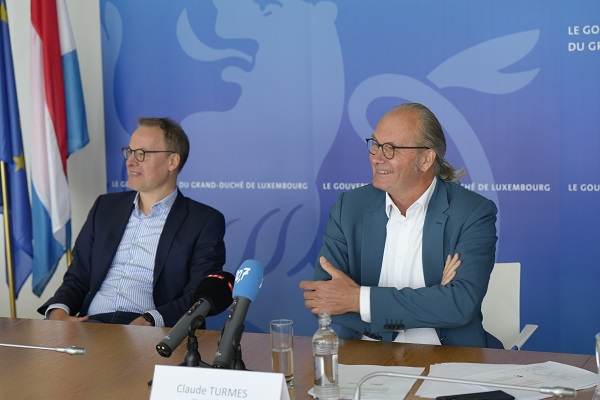 (L-R) Olaf Münichsdorfer, Luxembourg's Ministry of Energy and Spatial Planning; Claude Turmes, Minister of Energy, Minister for Spatial Planning;
Credit: MEA
(L-R) Olaf Münichsdorfer, Luxembourg's Ministry of Energy and Spatial Planning; Claude Turmes, Minister of Energy, Minister for Spatial Planning;
Credit: MEA
On Tuesday 19 September 2023, Luxembourg’s Minister for Energy and Spatial Planning, Claude Turmes, reviewed the work carried out by his ministry's two departments between 2018 and 2023.
Minister Turmes noted that this period had been marked, on the one hand, by a global climate and energy crisis, and, on the other hand, by the rise of renewable energies, the acceleration of measures to promote energy efficiency and electromobility, as well as the finalisation of the national development and territorial planning strategy in Luxembourg.
Minister Turmes commented: “Energy and land use planning are among the major challenges for the future of our country. With the Integrated National Energy and Climate Plan and the Master Regional Planning Programme, a framework enabling Luxembourg to be in a better position to meet the challenges of the future and to guarantee sustainable development of the country have been established."
The minister noted that wind turbine production has quadrupled over the last ten years and that Luxembourg is a pioneer in Europe in the field of energy standards for new buildings with regard to their energy consumption and their energy source.
“When it comes to infrastructure for electric mobility, Luxembourg ranks second in Europe in terms of charging points per 100 km. In collaboration with network managers, we have put in place an action plan to prepare our electricity network for the energy transition. Finally, we managed the energy crisis thanks to a huge effort by the entire staff of the Ministry of Energy and we ensured that the explosion in energy prices did not affect our fellow citizens,” he added.
According to the ministry, the entry into force of the four sectoral master plans represented a decisive step for territorial planning which, while the international consultation Luxembourg in Transition was a source of inspiration leading to several concrete projects, including those of the reconversion of the monofunctional commercial site of Foetz, the creation of a green belt in the Agglo-Centre (Luxembourg City and its surroundings) or the new mobility concept for the Belval site, including the Metzeschmelz site.
Finally, the Master Territorial Planning Programme (PDAT) allowed the country and its political decision-makers to better understand the future of the country for all of its territories, rural or urban, and its inhabitants, the ministry noted.
“Building a zero-carbon Luxembourg with a high quality of life for its citizens is the mission of regional planning. By involving civil society, using scientific data for planning and strengthening cross-border cooperation, we have prepared Luxembourg for a sustainable, resilient and desirable future for current and future generations,” commented Minister Turmes.








